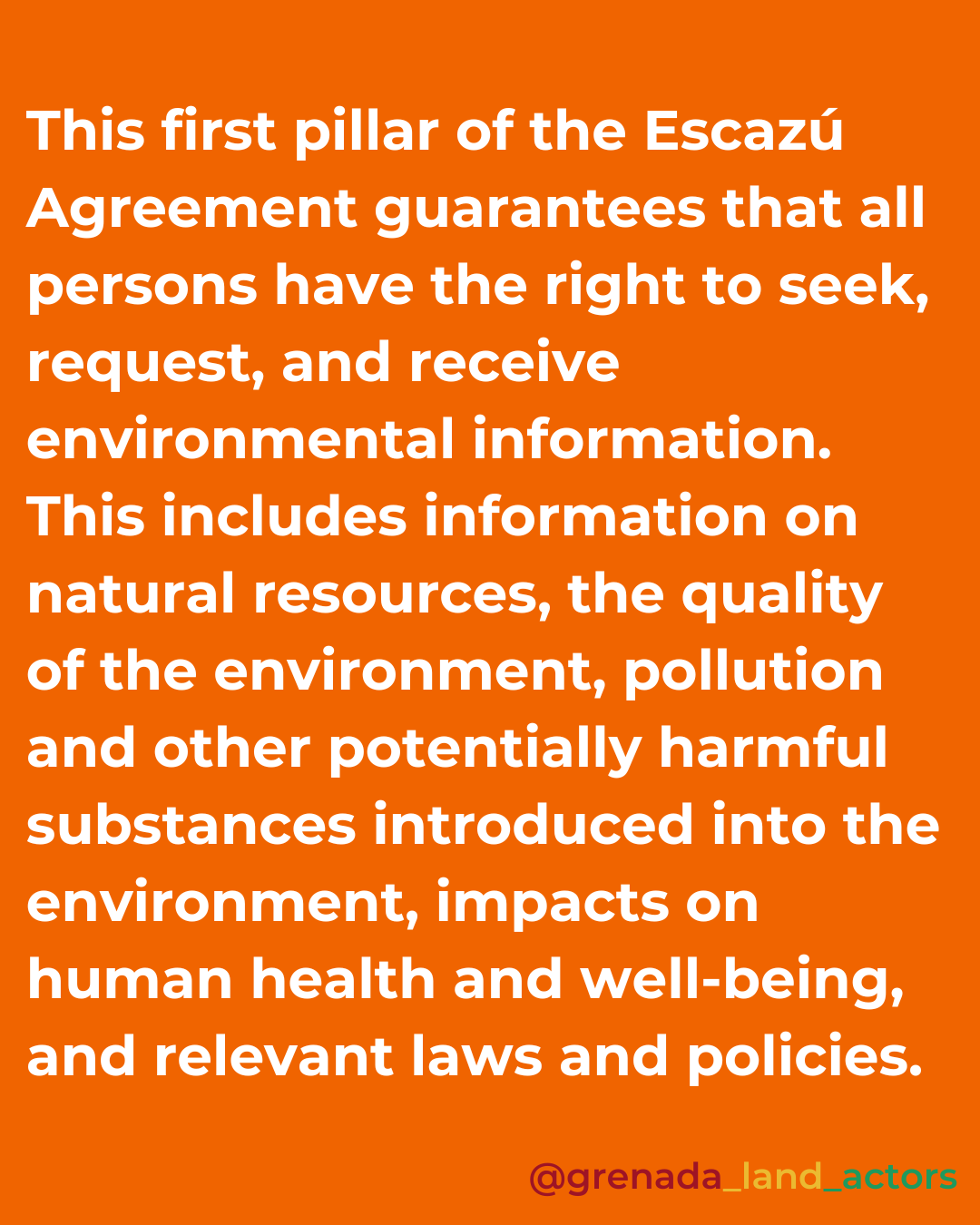ACCESS TO INFORMATION
This first pillar of the Escazú Agreement guarantees that all persons have the right to seek, request, and receive environmental information. It is the state’s responsibility to collect and regularly update information on natural resources, the quality of the environment, pollution and other potentially harmful substances introduced into the environment, impacts on human health and well-being, and relevant laws and policies. Persons can request any environmental information without having to declare a special reason, and the state must share whether they have the requested information in their possession. If the state declines to provide the information, citizens do have the right to appeal.
Environmental information must be shared in a variety of media (orally, in print, visual media, etc.) and must be comprehensible and accessible – i.e., available in a language that persons can understand. Our main language in Grenada is English, so this is less applicable for us, but for other islands with large Creole/Kreyol-speaking populations, information must be provided in those languages as well.
Overall, information should flow freely between government, private entities, and citizens, which leads us to the next pillar: the right to public participation.
PUBLIC PARTICIPATION
The second pillar of the Escazú Agreement is about public participation in decision-making processes. Related to the human right of self-determination, this right to participation aims to ensure that persons are not only aware of, but can be involved in shaping, environmental decisions that affect their lives and surrounding communities. It requires open dialogue between communities and government, as well as a good working relationship granting citizens opportunities to contribute to and evaluate environmental projects and policies.
A fundamental part of the right to public participation is ensuring equitable participation that incorporates vulnerable and underrepresented members of the population. This requires that states recognize and remove barriers to inclusion, whether race, language, social, economic, or geographic. Information has to be provided in an “early and timely” manner to allow all interested citizens time to receive and process the information before discussions. The state is also responsible for ensuring there is an accessible legal framework where affected citizens and communities can comment on the information provided by it or any private entity.
What the Escazú Agreement calls for is not just tokenistic participation, but for the public to be given a meaningful voice in environmental issues, even to the point of legal recourse. This leads to the final pillar: the right to justice.
“Without having specific and accurate information about the environmental impacts of a project, individuals and communities cannot prepare, take precautionary measures, or remediate situations that may affect them.”
JUSTICE IN ENVIRONMENTAL MATTERS
The third pillar of the Escazú Agreement provides safeguards for vulnerable communities and environmental defenders, i.e., those on the front lines of advocating for environmental issues. The “right to justice” means that these persons deserve fair counsel, procedural fairness, effective remedies, and no discrimination in legal processes.
Recognizing that environmental rights are human rights, when a person or community’s rights are violated, whether by development, pollution, or any other environmental harm, then that person or community is entitled to access and navigate the legal/judicial system for justice. This also applies to cases where communities have not received critical information nor been included in public participation processes about environmental issues.
Although the Escazú Agreement was not yet ratified at the time the judicial review was started, GLA’s case against the Planning & Development Authority provides a timely and local relevant example of legal justice being sought in an environmental matter. See blog updates linked below on the judicial review.
-
These sources provide valuable insights into the Escazú Agreement and its role in environmental governance and human rights protection across Latin America and the Caribbean.



